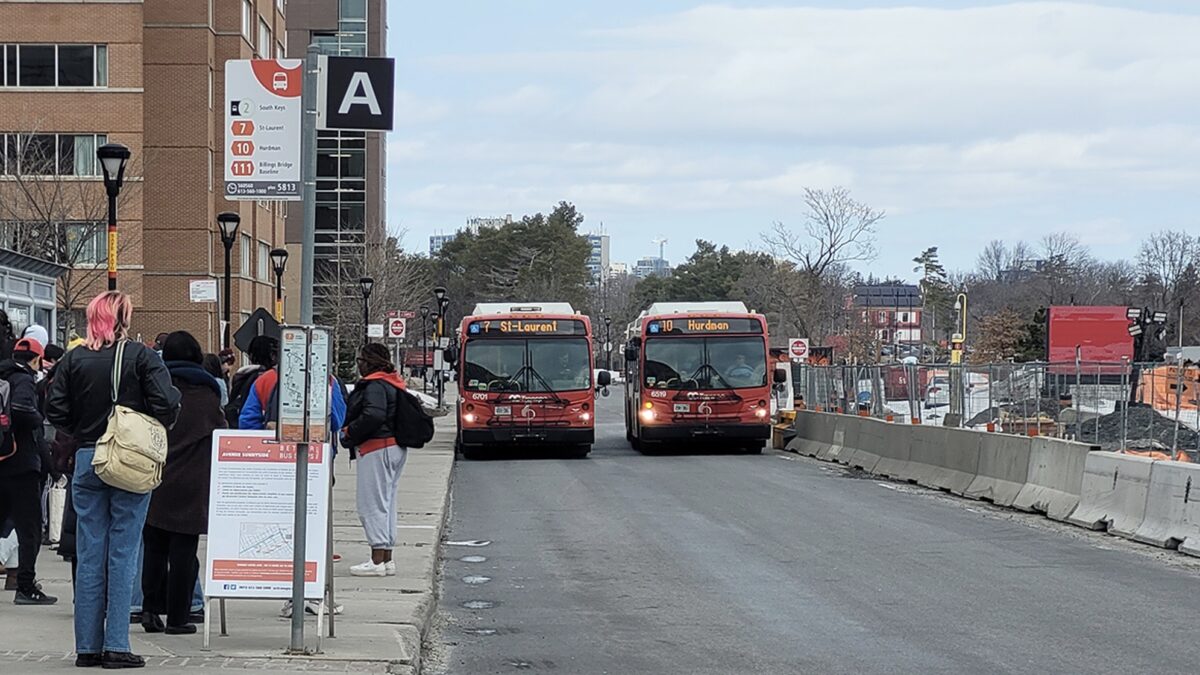OC Transpo’s 10 busiest bus routes keep to their schedule just two-thirds of the time on average, according to city data requested by Capital Current.
The data, which recorded the on-time performance of the routes between Dec. 25, 2022 and Jan. 19, shows the route with the worst record for buses running on time was the No. 85, a major east-west route from downtown Ottawa to Bayshore, with buses arriving as scheduled just 59 per cent of the time. The No. 7 and No. 88 tied for the second-worst performance, with just 61 per cent of buses arriving on time.
The No. 7 route runs between Carleton University and St. Laurent Boulevard through Ottawa’s downtown core. The No. 88 runs between Hurdman station and Kanata.
The route No. 2 LRT replacement bus had the best on-time performance at 78 per cent.
OC Transpo considers a bus late after five minutes and early if more than one minute ahead of schedule. Either way, a later or early bus is deemed not on time.
Kari Elliott, a founding member of advocacy group Ottawa Transit Riders, said she’s familiar with the chronically late No. 7 bus. “I have been on that bus where it has been faster to get out and walk because it’s stuck in traffic,” she said.
Elliott said traffic is affecting OC Transpo’s reliability, diminishing its ridership.
“As the system becomes unreliable, we end up in this death spiral,” she said. “Because it’s unreliable, people are taking their car and because they’re taking their car, traffic is really bad. And then transit gets stuck in traffic and becomes even more unreliable.”
Elliott proposed more dedicated bus lanes as a way to get buses out of traffic and improve reliability. “Dedicated bus lanes are a really cheap solution. It’s a whole bunch cheaper than building an LRT,” she said.
OC Transpo is struggling to regain its pre-pandemic ridership. February 2020 saw 8.7 million OC Transpo trips. As of December 2022, the figure stood at just 5.1 million.
Capital Current first asked the City of Ottawa for the performance of all routes within OC Transpo’s network. Processing that amount of data was not feasible, said a City of Ottawa media relations official. The spokesperson said the city only had the resources to provide data on 10 routes, a process that ultimately took more than a month.
'As the system becomes unreliable, we end up in this death spiral. Because it’s unreliable, people are taking their car. And because they’re taking their car, traffic is really bad. And then transit gets stuck in traffic and becomes even more unreliable.
— Kari Elliott, founding member, Ottawa Transit Riders
OC Transpo previously published the on-time performance for many of its routes. That reporting stopped in June 2019. The data is no longer available on OC Transpo’s website, but can be found through a web archive.
“OC Transpo is committed to managing and improving our service by analyzing data and key performance indicators,” service planning manager Matthew Wolstenholme said in a statement. OC Transpo “aims to provide additional metrics and data,” in the future, Wolstenholme added.
Elliott said she’d like to see better communication from OC Transpo. “If you can’t actually fix the system right now, at least communicate with people.”
OC Transpo tends to report cancelled busses over Twitter, said Elliott. “Not everybody’s on Twitter. Not everybody’s on Twitter while they’re standing at a bus stop.”
The city’s new budget, which was approved on March 1, reduced OC Transpo’s capital budget by $47 million. Elliott called the reduction “a huge mistake.”
“We declared a climate emergency a few years ago. One of the biggest things that a city can do to combat climate change is get people out of cars and on to public transit or bikes,” she said. “This city seems uninterested in promoting that.”
Elliott said students, people with disabilities and low-wage workers are among those most affected by OC Transpo’s unreliability. “When you have to be somewhere at a certain time and your bus is unreliable, that causes all kinds of stress and all kinds of problems.”
Current routes and schedules are oriented more toward downtown commuters, Elliott said. Low-wage workers “may be commuting to malls, they may be commuting to the Amazon warehouse.”
OC Transpo “should be focusing on people who are transit dependent and asking them, ‘What do you need from transit, where do you need the buses to go, when do you need them?’”





And there’s a presence to be established on the Mastodon/Fediverse network as well. OC Transpo’s going to want that fallback option for notifying the public should it happen that Musk finishes wrecking Twitter.
Keep in mind too that this data is massaged. OC Transpo routinely pulls buses from the schedule if they’re too late or if know they’re going to be problematic. A bus that normally shows up at 7am but I’d now pulled, will not contribute to this data – but will be felt by the customer who is now waiting a full cycle (+8m, +15m, +30m)
This reduces the amount of on-time disruptions and cancelation data generated.
No see transpo has been brutal for decades. Maybe if the City hired reliable people instead of friends and relatives they would do better.
If I would be incharge,I start asking some Hard Questions of & to the Driver’s along with the planning people. The slogan were here for You is BS. Also some drivers make enough to afford a Watch -(has low has $20 and applicable taxes) or check the Teleprompter located in passenger aliseway. City Responsibility make sure their Driver’s have a Valid driver’s licence and give them time to Update it if expired.